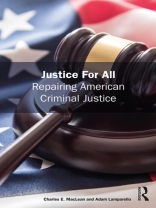Justice for All identifies ten central flaws in the criminal justice system and offers an array of solutions – from status quo to evolution to revolution – to address the inequities and injustices that far too often result in courtrooms across the United States.
From the investigatory stage to the sentencing and appellate stages, many criminal defendants, particularly those from marginalized communities, often face procedural and structural barriers that taint the criminal justice system with the stain of unfairness, prejudice, and arbitrariness. Systematic flaws in the criminal justice system underscore the inequitable processes by which courts deprive citizens of liberty and, in some instances, their lives. Comprehensive in its scope and applicability, the book focuses upon the procedural and substantive barriers that often prohibit defendants from receiving fair treatment within the United States criminal justice system. Each chapter is devoted to a particular flaw in the criminal justice system and is divided into two parts. First, the authors discuss in depth the underlying causes and effects of the flaw at issue. Second, the authors present a wide range of possible solutions to address this flaw and to lead to greater equality in the administration of criminal justice. The reader is encouraged throughout to consider and assess all possible options, then defend their choices and preferences. Confronting these issues is critical to reducing racial disparities and guaranteeing Justice for all.
Describing the problems and assessing the solutions, Justice for All does not identify all problems or all solutions, but will be of immeasurable value to criminal justice students and scholars, as well as attorneys, judges, and legislators, who strive to address the pervasive flaws in the criminal justice system.












